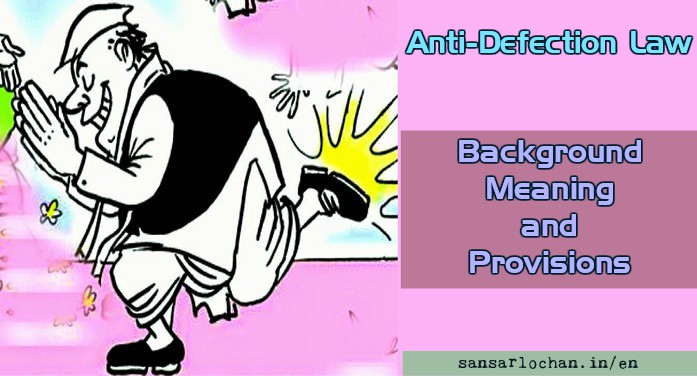What is Anti-Defection Law?
Before defining anti-defection law, we should understand the meaning of defection. When an elected representative joins another party without resigning his present party for benefits, it is called defection. Thus a defector is one who is elected from one party and enjoys power in another party.
The word defection is also called as “Floor Crossing” in UK and “Carpet Crossing” in Nigeria. In India, the term used for this is “Defection”. Defection is commonly known as “Horse Trading”. Defectors are also called “Fence Sitters” or “Turn Coats”.
Background
Rajiv Gandhi, the then Prime Minister of India, proposed a bill to remove the evils of defection. The Parliament passed the bill as a result of which anti-defection act came into force on 1st April 1985 through 52nd Constitutional Amendment.
52nd Amendment
The 52nd amendment to the Constitution laid down rules and procedures for restricting members of Parliament and State Legislatures from defecting from one party to the other at their sweet will. For this purpose a new schedule, known as the tenth schedule, was incorporated in the Constitution. Through this, the process by which legislators may be disqualified on grounds of defection was laid down in detail.
Provisions
The main intention of the law is to combat “the evil of political defections”. The provisions are:
- A member of Parliament or State Legislature belonging to any political party shall be disqualified if he quits his party at his own will.
- He will be disqualified from his membership if he votes against his party Whip or abstains from voting.
- If the member takes prior permission for voting or abstention from the party within 15 days from such voting or abstention, he/she shall not be disqualified.
- A member of Parliament or State Legislature belonging to any political party shall be disqualified from his membership if he votes in the session without prior permission of his party.
- A nominated member shall be disqualified from his membership in the Upper House if he joins any political party after six months from the date on which he assumes his position.
- If 2/3rd strength of any political party merges with another political party it shall not be considered as defection.
- A person disqualified under this Act shall not be provided any office of profit.
- The anti-defection law determines the size of the Council of Ministers. The size of the Council of Ministers shall not exceed 15% of the total members of Lok Sabha and State Legislative Assemblies.
- Speaker can start action against the members under anti-defection law.
- The Chairperson of Legislatures are permitted to frame the rules to implement this law.
- An independent member of the house shall be disqualified, if he joins any party after defection.
Some other provisions
- A person shall not be disqualified if his party merges with another party under this law.
- The Speaker and Deputy Speaker of Lok Sabha and Deputy Chairman of Rajya Sabha, the presiding officers of State Legislature shall not be disqualified under Anti-Defection law if they quit their original party.
- A person who is disqualified under anti-defection law can challenge the orders of the Speaker in the Court.
Important Articles for UPSC
Read all articles related to >> The Constitution

3 Comments on “Anti-Defection Law : Background, Meaning and Provisions”
Right now in karanataka there is no one party get single majority so BJP get 104 seat so if any congress party 10 MLA s can join bjp if they come to bjp then what will happen if bjp formed govt or that congress MLAs will disqualified for there seats
yes in this case those 10 mla can be refered as been horse trading, so those mla have to resign from his old party if they come with BJP.
In the provision(2), why there is need or importance to disqualify the member if he vote against the party whom he belongs to,